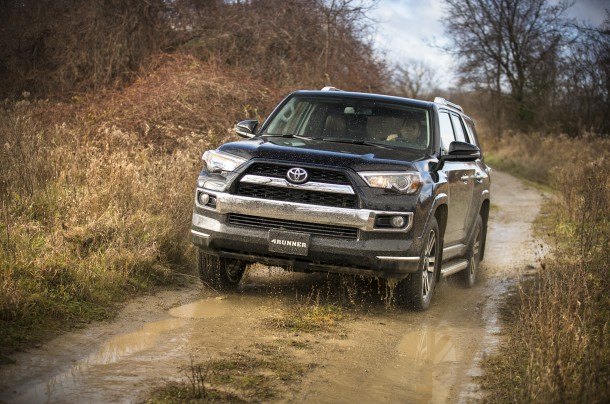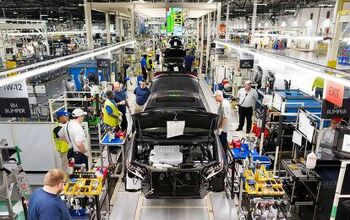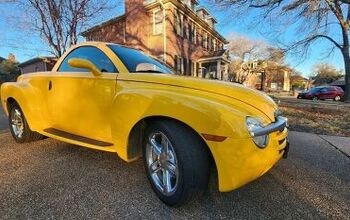QOTD: How Is The Toyota 4Runner So Damn Popular?

A few days ago, we all woke up to the sad news that the Nissan Xterra is going to be cancelled. This is especially depressing for people who post Instagram photos of themselves lifting weights.
Personally, I could take or leave the Xterra. It’s outdated, it’s trucky, it’s too tall, it’s a bit expensive, and it lacks a wide variety of modern technology. By this I am not referring to forward collision warning, or lane keep assist, or blind spot detection. I mean the base model doesn’t have a height-adjustable driver’s seat.
So the Xterra’s fifteen-year run is coming to an end, and we must all marvel at the fact that yet another off-roady vehicle won’t be available to us anymore. In the land of reasonably priced off-road vehicles, they all seem to vanish: the Toyota FJ Cruiser. The Suzuki Vitara, and Sidekick, and Samurai. The Ford Bronco. The K5 Blazer. All gone, replaced by something more mainstream, or not replaced at all, leaving the Jeep Wrangler to soldier on as today’s sole off-road vehicle choice.
Well, not quite today’s sole off-road vehicle choice. There’s also the Toyota 4Runner.
That’s right ladies and gentlemen: the 4Runner is still on sale, flying in the face of the trend that has seen virtually every automaker either cancel their body-on-frame SUV, change it into a crossover (Ford Explorer, Nissan Pathfinder), or move it upscale, like the Toyota Land Cruiser and the Range Rover. Indeed, the 4Runner still soldiers on, using the same old and trucky design it always has.
Who the hell is buying it?
You might think my question is unfounded, so allow me to explain myself. For one thing, the 4Runner starts at $34,500 with shipping. This isn’t tremendously expensive until you discover two things. Number one: the 4Runner comes standard with only basic items, like cloth seats, manual dimming mirrors, two-wheel drive, and a manual passenger seat. And number two: the Toyota Highlander starts at $30,500 with shipping, or roughly four grand less than the 4Runner.
Although I don’t consider the Highlander to be a true competitor to the 4Runner, I bring it into this discussion for an obvious reason: If you’re a family and you’re looking for a new family car, do you pick the smooth, car-based, easy-to-drive, well-equipped Highlander? Or do you spend four grand more and get the loud, truck-based, off-roader, overstyled 4Runner? You or I may choose option number two, but the vast majority of buyers would rather save the four grand and go for the more family-friendly vehicle.
So it must be off-roaders buying the 4Runner, then. And yet, the 4Runner seems like an expensive proposition if you’re taking it on the trails. A 4-door Jeep Wrangler starts at just $27,700 — around seven grand less than a base-level 4Runner. The average asking price for a new 4Runner on Autotrader is $39,905. And there are some models that cost more than fifty grand.
So the 4Runner isn’t comfortable enough to be a family crossover, and it’s too expensive to be an off-roader. So maybe the 4Runner competes with other trying-to-be-bold midsize SUVs, like the Nissan Murano and the Jeep Grand Cherokee?
The problem here is the 4Runner’s lack of technology. While those cars offer forward collision warning this and blind spot that and automatic this and touchscreen that, the 4Runner’s greatest safety advancement is a backup camera. And its best high-tech gadget is a push-button starter. A push-button starter that you can only get on the 4Runner Limited, which starts at $44,900 with shipping.
Now, is there a coalition of car buyers out there interested in an expensive, off-road-ready but sized-like-a-midsize-SUV, low-tech vehicle? Apparently the answer is yes, there is. I’m just curious exactly who it is.
I say this because Toyota’s SUV lineup now includes an almost amazing five vehicles — the RAV4, the Highlander, the 4Runner, the Sequoia, and the Land Cruiser. And this is without a subcompact Honda HR-V-sized vehicle, which we can only assume Toyota is poised to make in the next few years. So with all those models and all those choices, how are they still finding buyers for the 4Runner?
To me, it’s impressive: despite the segment crashing down around it; despite newer technology everywhere else; despite cheaper rivals better suited for daily duties; despite its high pricing, the 4Runner has braved it all. How does it do it? Has its 4Runner name achieved cult status, like the Jeep Wrangler? Who’s still buying the Toyota 4Runner?

More by Doug DeMuro
Latest Car Reviews
Read moreLatest Product Reviews
Read moreRecent Comments
- Jalop1991 This is easy. The CX-5 is gawdawful uncomfortable.
- Aaron This is literally my junkyard for my 2001 Chevy Tracker, 1998 Volvo S70, and 2002 Toyota Camry. Glad you could visit!
- Lou_BC Let me see. Humans are fallible. They can be very greedy. Politicians sell to the highest bidder. What could go wrong?
- SPPPP Vibrant color 9 times out of 10 for me. There may be a few shapes that look just right in metallic gray, for example. There are a few nices ones out there. And I like VW "White Silver". But I'd usually prefer a deep red or a vibrant metallic green. Or a bright blue.
- 28-Cars-Later Say it ain't so, so reboot #6* isn't going to change anything?[list=1][*]V4-6-8 and High "Tech" 4100.[/*][*]Front wheel drive sooooo modern.[/*][*]NOrthSTARt.[/*][*]Catera wooooo.[/*][*]ATS all the things.[/*][*]We're *are* your daddy's Tesla. [/*][/list=1]


































Comments
Join the conversation
Some people love the 4Runner, many don't. We have a Limited that my wife adores. Goes anywhere in the Winter with snow tires or chains. Goes through mud easily (not the crappy stock Limited tires). Drives like a truck, which she likes. Has 7 seats, the back two fold flat. Toyota reliability. Holds it's value like crazy. I guess I would ask if you've driven one. The SR5 is uninspired and not impressive at all - hate the handling. The Trail and TRD Pro handle great on road and off. The Limited has this crazy good suspension system that essentially eliminates body roll around corners. It's amazingly effective. Given the price and other choices for a 7 passenger vehicle, the 4Runner is by far the best option for us. Nothing else is even close.
When my 1996 Blazer finally bit the dust (at 233K) I wanted a replacement. But what is out there now? Real truck SUVs no longer exist, except for the 4Runner. I looked into a Grand Cherokee, but everywhere I researched I read nothing but problems. And what mid sized SUV tows anything reasonable anymore (that is not Jeep)? Only the 4Runner qualified for my requirements, quality/longevity and towing. However, I do find the modern 4Runners quite large. I can barely reach the top rack and I'm 6'2", whereas on my Blazer I could easily reach the rack. I also miss the column shifter. Now they put both the shifter and the 4WD knob in the middle where everybody can spill stuff all over them. I personally think that for people who require a true off-roader, the 4Runner trail is ideal, and that toyota should scale back the size to something more reasonable for commuters. Even a subaru will go almost anywhere, so why does it really need so much suspension and clearance? If Toyota came out with a Blazer sized truck, I would trade in instantly.